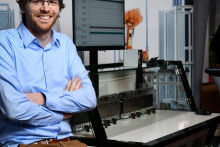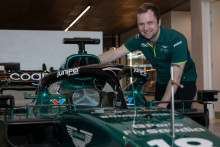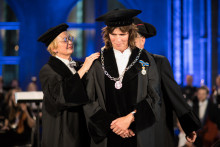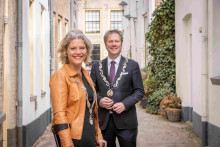In his younger years, Robert loved pulling things apart to see how they worked or to fix them. A technical study programme, such as electrical engineering, mechanical engineering or physics, was always in his cards. ‘I am glad that I chose electrical engineering. My knowledge comes in handy in so many different ways. Power electronics, medical technology or photonics: I deal with all that and more at the company I now work for,’ he says.
A system architect
Robert is a systems architect at Prodrive, a major player in the high-tech industry and a supplier for companies such as Philips and ASML, among others. ‘Simply put, we develop high-tech components or entire systems for our clients and handle nearly everything ourselves. The great thing about this approach is that you get to experience the whole product journey, from initial design to serial production.’
As a systems architect, he is responsible for the technical aspects of a system, such as a detector system in a machine for ASML. ‘You are dealing with precise analog electronic, digital electronics, high speed data interfaces, but also fine mechanics, material science, and physics, that all come together in one system. It is like a puzzle that you and your team must solve using your experience and creativity. It feels amazing to finally pull it off.’
Brookhuis obtained his doctoral degree at the UT with research into nanotechnology. ‘I was drawn to the fine nature of microsystems and microelectronics. I made a lot of things myself. That is a great way to learn what works and what doesn’t. My experience with process knowledge is quite unique and I still reap the benefits of it today. At Prodrive, we often work on projects with a strict deadline. In those cases, it is good to not only master the theory, but also understand what is and isn’t feasible in practice. When you have to finish something on time, a correct risk assessment is truly essential. The combination of theoretical knowledge and practical competence is in high demand at many organisations.’
Opportunities
The electrical engineering programme offers excellent career opportunities in any case. Brookhuis knows that from first-hand experience. He never applied for a job at Prodrive; instead, he had such a great talk with the company’s representatives during an open day that he was invited. ‘In high school, career opportunities are the last thing you want to worry about. You want to do what you love. Luckily, those two aspects come together in the field of electrical engineering. Companies are desperately looking for new talent. I don’t expect that to change any time soon, either. Whatever piece of technology you can think of, from medical equipment to your smartphone or an (autonomous) vehicle, everything has electronics in it.’
He recently came back to the university to introduce the newest generation of students to Prodrive. ‘I know from experience how well the programme ties into the practical reality of working in this field, because I am an alumnus myself. Electrical engineering is highly recommendable because it is such a comprehensive field. You have to be excited and feel the drive to achieve the best possible technical results. You always operate on the cutting edge of multiple fields, including mathematics and physics. The best feeling in the world is when your knowledge is applied in a practical solution.’







